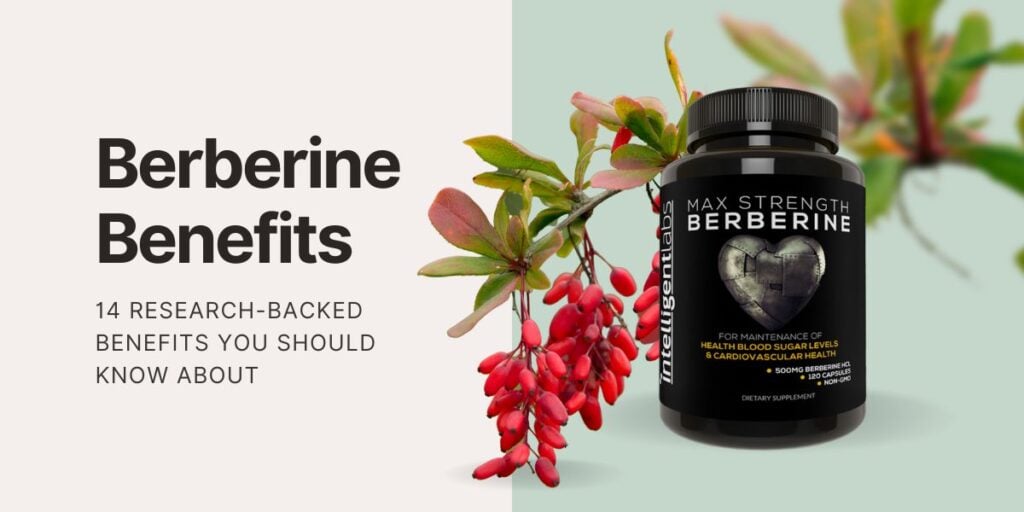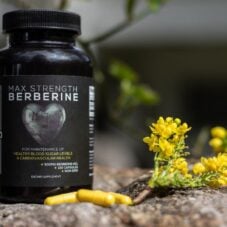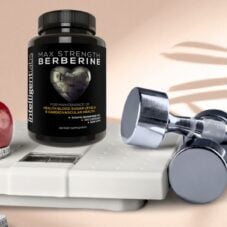Nutrition
14 Amazing Research-Backed Berberine Benefits!
Berberine is a natural compound found in plants like Goldenseal and Oregon grape. People have been using it for centuries, and now science is showing just how powerful it is! From weight loss to blood sugar control, Berberine is packed with health benefits. Ready to find out what our pure Berberine supplement can do for you? Let’s dive into 14 amazing, research-backed benefits!
Table of Contents
What is Berberine used for? Here are 14 science-backed benefits!
Here’s an infographic that summarizes the different ways Berberine can help you. If you’d like to read more about each benefit, just scroll down!
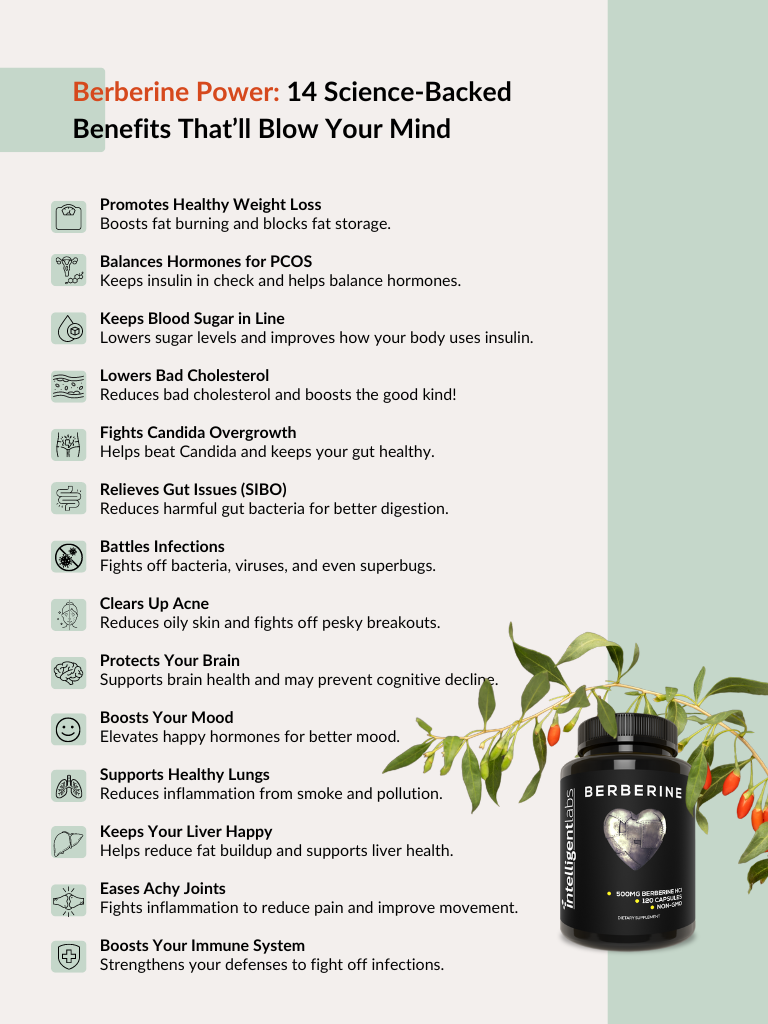
1. Berberine May Help with Weight Loss
Berberine may contribute to weight loss in several ways. First, it activates AMPK, often referred to as a “metabolic master switch”, which boosts fat burning by increasing energy use in the body. It also blocks your body from storing extra fat and helps control important hormones like insulin, leptin, and adiponectin, which can affect your weight. 1
Additionally, Berberine may enhance the activity of brown fat, a type of fat that burns energy rather than storing it. 2
How much Berberine to take daily for weight loss?
Take 500mg of Berberine 3x a day with meals. Studies show this dosage helps people lose weight, lower triglycerides, and improve cholesterol. 3
2. Berberine Balances Hormones for PCOS
If you have PCOS, balancing insulin is key. Taking a Berberine supplement for PCOS helps your cells absorb sugar better, meaning your body doesn’t need to pump out as much insulin. This also keeps your hormones (like testosterone) in check, reducing those frustrating PCOS symptoms like acne and irregular cycles. 4 5
How much Berberine to take for PCOS management?
Start with 500mg 3x a day with meals. If you’re new to Berberine, try 500mg twice a day at first to avoid any tummy troubles. For best results, we suggest following a PCOS diet as well.
3. Berberine Keeps Blood Sugar in Check
Struggling with high blood sugar and diabetes? Berberine’s got your back. It helps lower your blood sugar levels by promoting insulin sensitivity, that is, it makes your body more sensitive to insulin. Plus, it reduces glucose production in the liver, making Berberine supplements helpful for those with diabetes. 6
How much Berberine to take for blood sugar control?
Take 1x 500mg capsule with meals, e.g. one capsule at breakfast, another at lunch, and the last one at dinner.
4. Berberine Lowers Bad Cholesterol
Berberine can be your heart’s best friend! Research shows that Berberine can lower total cholesterol, bad cholesterol (LDL), and triglycerides while increasing good cholesterol (HDL). It also helps reduce apolipoprotein B, a key heart disease marker. 7 8 9
On top of that, Berberine even boosts nitric oxide, which helps relax arteries, improve blood flow, and lower blood pressure. 10
How much to take for cholesterol control?
Take 500mg 3x a day with meals. Some studies go as high as 3g a day, but start small and see how your body responds.
5. Berberine Fights Candida Overgrowth
Candida overgrowth can cause a range of issues like fatigue, digestive problems, and infections. Berberine steps in as a natural anti-fungal. It helps inhibit the growth of Candida albicans, the pesky yeast responsible for these problems.
By restoring balance to your gut flora, Berberine not only tackles Candida but also supports overall digestive health. Plus, it boosts the effectiveness of other anti-fungal treatments, giving you an extra edge in beating Candida. 11
How much Berberine to take for Candida:
Take 500mg of Berberine 3x daily with meals. Pairing Berberine with an anti-Candida diet can help starve the yeast effectively!
6. Berberine May Relieve Gut Issues (SIBO)
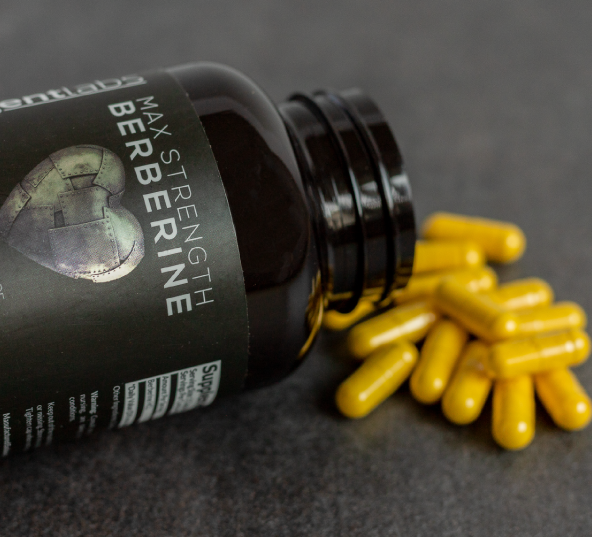
Struggling with bloating, gas, or abdominal discomfort? You might be dealing with Small Intestine Bacterial Overgrowth (SIBO). Berberine’s antimicrobial properties make it effective at targeting the bad bacteria causing these problems.
Unlike antibiotics that can wipe out both good and bad bacteria, Berberine selectively reduces harmful bacteria, helping restore a healthy balance in your gut. This means less bloating and a happier tummy overall. 12
How much Berberine supplement to take for SIBO:
Take 500mg 3x daily with meals.
7. Berberine May Help Fight Various Infections
Studies show that Berberine might inhibit harmful bacteria like Staphylococcus and Streptococcus, which can cause infections such as urinary tract infections and strep throat. 13 It also has antiviral effects, helping your body fend off illnesses like the flu. 14 Plus, Berberine has been shown to be effective against antibiotic-resistant strains, making it a valuable ally in staying healthy. 15
How much Berberine to take for infection protection:
Take 500mg 3x daily with meals.
8. Berberine Helps Clear Acne
Acne can be a stubborn issue, but Berberine offers a natural solution. It helps regulate oil production in your skin, preventing those pores from getting clogged. Its anti-inflammatory properties reduce redness and swelling, calming down existing breakouts.
In studies, people taking Berberine saw a significant reduction in acne and overall improvement in skin health. By addressing both the cause and the symptoms, Berberine helps you achieve clearer, happier skin. 6
How much Berberine to take for acne and skin health?
We suggest taking 500mg-1000mg a day with meals. If your acne is a symptom of PCOS, take 500mg of Berberine 3 times a day with meals.
9. Berberine Benefits May Include Brain Protection
Keeping your brain sharp as you age is a big deal, and Berberine might help with that. Studies suggest that Berberine supplements can protect brain cells from damage caused by harmful proteins like beta-amyloid, which are linked to Alzheimer’s disease. 16
By supporting healthy brain function and reducing inflammation, Berberine could help slow cognitive decline and memory loss. Although more research is needed, the early results are promising for anyone looking to maintain brain health. 17
How much Berberine to take for brain health support?
Take 500mg 3x daily with meals.
10. Berberine May Be a Natural Mood Booster
Feeling down? Berberine might help lift your spirits by increasing levels of “feel-good” neurotransmitters like serotonin, dopamine, and norepinephrine.
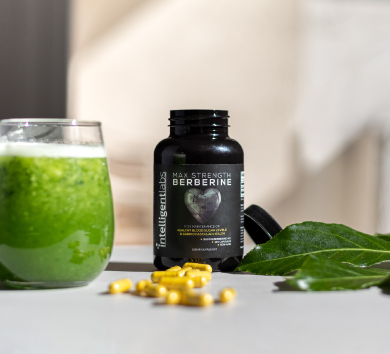
By balancing these levels, Berberine could help reduce symptoms of depression and improve overall mental well-being. It’s also thought to help by reducing inflammation, which is often linked to mood disorders like depression. 18 19
How much Berberine to take for mood enhancement:
Take 500mg three times daily with meals.
11. Berberine Supports Healthy Lungs
Studies have shown that Berberine can help reduce lung inflammation and improve respiratory health in mice exposed to harmful smoke. While more research is needed in humans, Berberine’s ability to protect the lungs from damage could make it a useful supplement for those exposed to air pollution or secondhand smoke. 20
How much Berberine to take for lung support:
Take 500mg 3 times a day with meals.
12. Berberine Helps Your Liver Stay Healthy
Non-alcoholic fatty liver disease (NAFLD) is a growing issue, especially for people with obesity or diabetes. Berberine steps in by helping the liver burn fat more efficiently and reducing the buildup of fat in liver cells. It also helps regulate glucose production in the liver, which is important for overall metabolic health. 21 22 23
How many mg of Berberine should I take:
Take 500mg 3x daily with meals.
13. Berberine Eases Achy Joints
Joint pain from arthritis or inflammation can really slow you down. Berberine’s anti-inflammatory properties can help reduce swelling and pain in your joints, making movement easier. Studies have shown that Berberine may lower inflammation markers in conditions like rheumatoid arthritis and gout. 24 25
How much Berberine to take for joint health:
Take 500mg 3x daily with meals.
14. Berberine Benefits Include Boosting Your Immune System
Berberine doesn’t just fight off infections—it also strengthens your immune system overall. By helping your body maintain a healthy balance of gut bacteria, Berberine supports your immune system’s ability to fend off pathogens. It’s a great supplement to support your body’s natural defenses. 13 15
How much Berberine supplement to take for daily immune protection:
Take 500mg 3 times a day with meals.
Conclusion – Does Berberine Work?
Yes, Berberine works, and scientific research backs it up! Whether you’re looking for better metabolic health or improved immune support, Berberine is a natural option that’s safe, effective, and affordable. With its versatility and evidence-based benefits, it’s a supplement worth considering for overall health and wellness.
💬 Something on your mind? Share your thoughts in the comments. We love hearing from curious minds.
📩 And while you’re here, join our newsletter for more smart stuff (and secret perks)!
References:
- Yang J, Yin J, Gao H, et al. Berberine improves insulin sensitivity by inhibiting fat store and adjusting adipokines profile in human preadipocytes and metabolic syndrome patients. Evid Based Complement Alternat Med. 2012;2012:363845. doi:10.1155/2012/363845 ↩︎
- Zhang Z, Zhang H, Li B, et al. Berberine activates thermogenesis in white and brown adipose tissue. Nat Commun. 2014;5:5493. Published 2014 Nov 25. doi:10.1038/ncomms6493 ↩︎
- Hu Y, Ehli EA, Kittelsrud J, et al. Lipid-lowering effect of berberine in human subjects and rats. Phytomedicine. 2012;19(10):861-867. doi:10.1016/j.phymed.2012.05.009 ↩︎
- Zhao L, Li W, Han F, et al. Berberine reduces insulin resistance induced by dexamethasone in theca cells in vitro. Fertil Steril. 2011;95(1):461-463. doi:10.1016/j.fertnstert.2010.07.1090 ↩︎
- Fouladi RF. Aqueous extract of dried fruit of Berberis vulgaris L. in acne vulgaris, a clinical trial. J Diet Suppl. 2012;9(4):253-261. doi:10.3109/19390211.2012.726702 ↩︎
- Wei W, Zhao H, Wang A, et al. A clinical study on the short-term effect of berberine in comparison to metformin on the metabolic characteristics of women with polycystic ovary syndrome. Eur J Endocrinol. 2012;166(1):99-105. doi:10.1530/EJE-11-0616 ↩︎
- Dong H, Zhao Y, Zhao L, Lu F. The effects of berberine on blood lipids: a systemic review and meta-analysis of randomized controlled trials. Planta Med. 2013;79(6):437-446. doi:10.1055/s-0032-1328321 ↩︎
- Shidfar F, Ebrahimi SS, Hosseini S, Heydari I, Shidfar S, Hajhassani G. The Effects of Berberis vulgaris Fruit Extract on Serum Lipoproteins, apoB, apoA-I, Homocysteine, Glycemic Control and Total Antioxidant Capacity in Type 2 Diabetic Patients. Iran J Pharm Res. 2012;11(2):643-652 ↩︎
- Cicero AF, Rovati LC, Setnikar I. Eulipidemic effects of berberine administered alone or in combination with other natural cholesterol-lowering agents. A single-blind clinical investigation. Arzneimittelforschung. 2007;57(1):26-30. doi:10.1055/s-0031-1296582 ↩︎
- Cardiovascular and metabolic effects of Berberine, Flora Affuso, Valentina Mercurio, Valeria Fazio, and Serafino Fazio, World J Cardiol. 2010 Apr 26; 2(4): 71–77. ↩︎
- Wei GX, Xu X, Wu CD. In vitro synergism between berberine and miconazole against planktonic and biofilm Candida cultures. Arch Oral Biol. 2011;56(6):565-572. doi:10.1016/j.archoralbio.2010.11.021 ↩︎
- Cernáková M, Kostálová D. Antimicrobial activity of berberine–a constituent of Mahonia aquifolium. Folia Microbiol (Praha). 2002;47(4):375-378. doi:10.1007/BF02818693 ↩︎
- Modulating gut microbiota as an anti-diabetic mechanism of berberine Junling Han, Huiling Lin and Weiping Huang, Med Sci Monit. 2011; 17(7): RA164–RA167. ↩︎
- Berberine Hampers Influenza A Replication through Inhibition of MAPK/ERK Pathway, Paweł Botwina, Katarzyna Owczarek et al. Viruses. 2020 Mar; 12(3): 344. ↩︎
- Chu, M., Zhang, Mb., Liu, Yc. et al. Role of Berberine in the Treatment of Methicillin-Resistant Staphylococcus aureus Infections. Sci Rep 6, 24748 (2016). ↩︎
- Berberine: A Potential Multipotent Natural Product to Combat Alzheimer’s Disease, Hong-Fang Ji, Liang Shen, Molecules 2011, 16(8), 6732-6740 ↩︎
- Jiang W, Li S, Li X. Therapeutic potential of berberine against neurodegenerative diseases. Sci China Life Sci. 2015;58(6):564-569. doi:10.1007/s11427-015-4829-0 ↩︎
- Kulkarni SK, Dhir A. On the mechanism of antidepressant-like action of berberine chloride. Eur J Pharmacol. 2008;589(1-3):163-172. doi:10.1016/j.ejphar.2008.05.043 ↩︎
- Peng WH, Lo KL, Lee YH, Hung TH, Lin YC. Berberine produces antidepressant-like effects in the forced swim test and in the tail suspension test in mice. Life Sci. 2007;81(11):933-938. doi:10.1016/j.lfs.2007.08.003 ↩︎
- Lin K, Liu S, Shen Y, Li Q. Berberine attenuates cigarette smoke-induced acute lung inflammation. Inflammation. 2013;36(5):1079-1086. doi:10.1007/s10753-013-9640-0 ↩︎
- Kim WS, Lee YS, Cha SH, et al. Berberine improves lipid dysregulation in obesity by controlling central and peripheral AMPK activity. Am J Physiol Endocrinol Metab. 2009;296(4):E812-E819. doi:10.1152/ajpendo.90710.2008 ↩︎
- Update on Berberine in Nonalcoholic Fatty Liver Disease, Yang Liu, Li Zhang, Haiyan Song and Guang Ji, Evid Based Complement Alternat Med. 2013; 2013: 308134. ↩︎
- Berberine ameliorates nonalcoholic fatty liver disease by a global modulation of hepatic mRNA and lncRNA expression profiles, Xinlu Yuan, Jie Wang, Xiaoyan Tang, Yixue Li, Pu Xia and Xin Gao, J Transl Med. 2015; 13: 24. Published online 2015 Jan 27. ↩︎
- Wang Z, Chen Z, Yang S, et al. Berberine ameliorates collagen-induced arthritis in rats associated with anti-inflammatory and anti-angiogenic effects. Inflammation. 2014;37(5):1789-1798. doi:10.1007/s10753-014-9909-y ↩︎
- Fang, Shan, et al. “Mechanism Underlying the Action of Berberine in the Treatment of Gouty Arthritis Based on Network Pharmacology.” Natural Product Communications, vol. 18, no. 1, 30 Dec. 2022, p. 1934578X2211436, https://doi.org/10.1177/1934578×221143627. ↩︎


